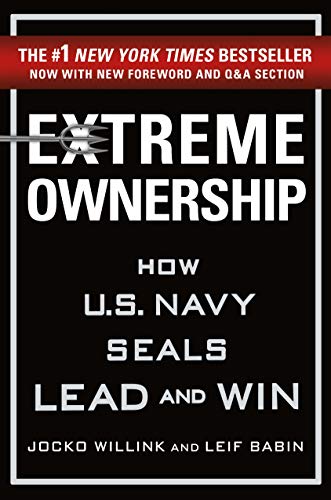Extreme Ownership — Book Summary
Introduction
The authors give several examples of experiences they had in Iraq. They explain leadership principles that they leaned or followed in this experience. Then they proceed to explain how those the way SEALs apply those principles can help in a business atmosphere.
An interesting quote from the book
The best leaders checked their egos, accepted blame, sought out constructive criticism, and took detailed notes for improvement. They exhibited Extreme Ownership, and as a result, their SEAL platoons and task units dominated.
— Jocko Willink, Extreme Ownership
Summary of the book Extreme Ownership
Two Navy SEAL leaders have given us an amazing look into how SEAL teams are led and how leadership principles are learned and applied. There are three specific principles that are discussed; extreme ownership, believing in your plan, and decisiveness amid uncertainty. There are also some minor principles that are discussed such as prioritizing and executing, planning, and discipline equals freedom. All of these principles will really make a difference in your leadership experience.
Extreme ownership means taking ownership of all aspects of your team, the project, your own actions, etc. When a project goes bad a leader should not attempt to assign blame to members of the team, another team, or anything else. If the project has not gone well it is because the leader has failed in some way or form and they need to analyze the situation and determine what went wrong and fix it. "The best leaders checked their egos, accepted blame, sought out constructive criticism, and took detailed notes for improvement. They exhibited Extreme Ownership, and as a result, their SEAL platoons and task units dominated." In the business world it means the same thing, accept blame if there is some, seek out constructive criticism and learn from the experience.
Belief in the plan or decisions being made is essential for any leader or team. If the plan is not understood or the front-line workers do not believe that the decisions being made are in their best interests or the companies, they will not put in the work needed to accomplish it. Front line workers, team leaders, middle managers all need to understand the how and why of any plan or decision. Without this understanding they will not believe in the mission. "So, if you ever get a task or guidance or a mission that you don't believe in, don't just sit back and accept it. Ask questions until you understand why so you can believe in what you are doing, and you can pass that information down the chain to your team with confidence, so they can get out and execute the mission. That is leadership."
Decisiveness amid uncertainty is making sure that the project or plan is moving forward even though something unexpected has happened. On the battlefield anything can happen at any moment and the best plans can be disrupted. The leader on the battlefield must be prepared to fall back to his knowledge of the team and their training, knowledge of how the enemy operates, and experience to make immediate decisions to get the plan back on track. In the business world it is similar. Don't let a minor disruption take you or your team away from the plan that you believe in. Be prepared to make the hard decisions when the time comes and rely on your experience and knowledge to get through it.
On the battlefield nothing can make up for not prioritizing and executing to accomplish the mission. If you try to handle several things at once with no plan, then chaos ensues, and the mission will not be accomplished. This principle goes hand in hand with planning. A successful mission depends on good talent and fantastic training. However, the plan for the mission is the most important and making sure that everyone on the team knows the plan, believes in the plan and can prioritize and execute the plan. Another important part is knowing what to prioritize and execute when chaos ensues as it inevitably will. A leader must know what needs to get done first, and then what is next. To keep the team moving forward.
The final important principle is the idea that discipline equals freedom. Some would have you believe that the more restrictions or procedures that you need to do takes away your freedom to be able to accomplish things. There is some truth to that as you can get situations where to many procedural actions can be too much. There must be a balance. You must find that sweet spot where the tasks to be completed are done right every time, and there being too many tasks to complete. But if the team is focused and has the discipline to work through all of the tasks the right way every time it brings freedom.
SEALs are amazing warriors and an incredibly disciplined group of soldiers. Knowing how they are able to lead their teams to execute their missions is something that every leader could learn. The principles of extreme ownership, believing in your plan, and decisiveness amid uncertainty can take you and your team to the next level. Along with the other principles of prioritizing and executing, planning, and discipline equals freedom can make your team top notch. Leaders who review and implement these principles will be a cut above their peers and will be able to help their team and their companies excel.
What can we learn from the book Extreme ownership?
Lesson 1: Extreme Ownership
- Taking complete and total ownership of your team and your work
- Check your ego
- Accept blame
- Seek out constructive criticism
- Take Detailed notes for improvement
Lesson 2: Believing in your plan
- Make sure the front-line believes in the plan
- If you don't understand the plan, ask questions to clarify
- Train and practice until the team understands and believes in the plan
- Get out and execute the plan
Lesson 3: Decisiveness amid uncertainty
- Anything can happen at any moment and the best plans can be disrupted
- Be prepared to rely on knowledge of the team and their training, knowledge of how the enemy operates, and experience to make immediate decisions to get the plan back on track
- Don't let a minor disruption take you or your team away from the plan that you believe in
- Make the hard decisions when the time comes
Review of the book Extreme Ownership
I loved this book. I thought that it had the appropriate level of experiences from the battlefield and business that would allow any leader to learn from. I enjoyed learning about the SEAL teams and their operations. The principles we aligned with correct business principles that can help any leader or team. I found that the principle of extreme ownership could really help me in my business relationships and the teams that I work with. I also thought that the principle of decisiveness amid uncertainty is something that can really help in the business world. I have had experiences where this could have helped my team move forward. I believe this book is very timely and can help leaders work and lead more effectively.
Conclusion
I would recommend this book to any level leader in a company. The principles can really help in knowing how to lead. But also, this book would be good for those who are members of a team and how they could help the leader of their team. I believe SEALs and their leaders could help many people understand the situations they get into better and know how to respond.
Don't miss the other book summaries on SunInMe.org

